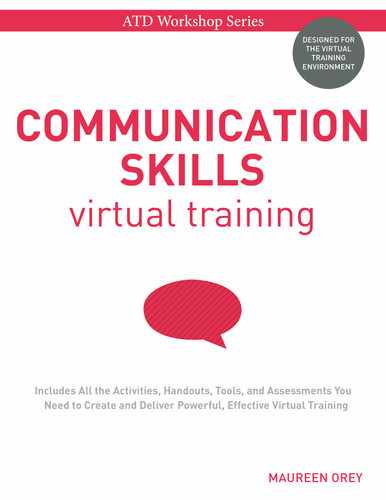Contents
INTRODUCTION: HOW TO USE THIS BOOK
Why Do Communication Skills Matter?
What Do I Need to Know About Training?
What Considerations Need to Be Addressed in a Virtual Delivery Model?
How Much Time Will Preparation Take?
What Are the Important Features of the Book?
1 TWO-DAY COMMUNICATION SKILLS WORKSHOP
Considerations for the Virtual Environment
Two-Day Workshop Agenda: Day 1
What to Do Between Workshop Days
Two-Day Workshop Agenda: Day 2
2 ONE-DAY COMMUNICATION SKILLS WORKSHOP
Considerations for the Virtual Environment
3 HALF-DAY COMMUNICATION SKILLS WORKSHOP
Considerations for the Virtual Environment
4 USTOMIZING THE COMMUNICATION SKILLS WORKSHOP
Customizing the Content and Activities
Customizing the Workshop Format
Communication Skills Workshop Series
Small Bites—Lunch & Learn Seminars
SECTION II: ESSENTIALS OF EFFECTIVE COMMUNICATION SKILLS TRAINING
5 IDENTIFYING NEEDS FOR COMMUNICATION SKILLS TRAINING
Individual Learning Needs Analysis
6 UNDERSTANDING THE FOUNDATIONS OF TRAINING DESIGN
7 DELIVERING YOUR COMMUNICATION SKILLS WORKSHOP: BE A GREAT FACILITATOR
A Strong Start: Introduction, Icebreakers, and Openers
Training Platform and Participant Management
A Word About Dealing with Difficult Participants
Level 1. Measuring Participant Reactions
Level 2. Measuring the Extent to Which Participants Have Learned
Level 3. Measuring the Results of Training Back on the Job
Level 4. Measuring the Organizational Impact of Training
SECTION III—POST-WORKSHOP LEARNING
Increasing Training Results Through Follow-Up: What to Do After the Workshop
Follow-Up Virtual Peer Interactions
Creating an Open Culture for Effective Communication
SECTION IV—WORKSHOP SUPPORTING DOCUMENTS AND ONLINE SUPPORT
Learning Activities Included in Communication Skills Virtual Training
To Pre-Work or Not to Pre-Work …
Assessments Included in Communication Skills Virtual Training
Handouts Included in Communication Skills Virtual Training
Access to Free Supporting Materials
Distributing Materials to Participants
